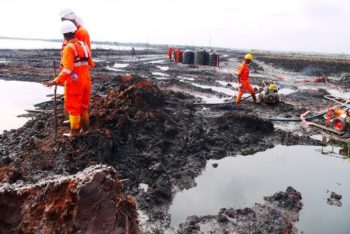
During the last visit to Ilaje in Ondo State as part of the Niger Delta Town Hall meetings, the Vice President told pressmen at a media chat that it is public knowledge that the Ogoni Clean-up exercise had commenced. When Barry, an indigene of Ogoni, was asked about the progress of the cleanup exercise inaugurated by the government last year, he simply responded with a hiss and later said, “We knew they were only handing us a basket full of empty promises; there is no cleanup anywhere and there might never be any. We have accepted fate.” In another instance, the Publicity Secretary of the Movement for the Survival of the Ogoni People (MOSOP), Fegalo Nsuke said, “The progress made on the Ogoni cleanup is known only to the government.”
The above assertions are indicative of a people that have become disenchanted and completely frustrated. They seem to have lost faith in the government. For many years the people in this area have lived in a dangerously polluted land caused by oil spill as a result of oil exploration and production.
On June 2, 2016 the Federal Government of Nigeria launched the $1billion Ogoni clean-up exercise amidst a visibly elaborate event that drew the attention of the world. The event was truly a befitting platform for the Vice President, who represented the President, to deliver a glowing and uplifting strategy for the project. According to the President, it was not just a clean-up exercise; it was part of a strategic and holistic plan to provide employment for the people of Ogoni. “The methodology for the clean-up will ensure job creation for young people. The agro-allied industries required for processing of agricultural produce will also be put in place,” the President said. But for the people of the land, the most important thing is to have their ancestral ecosystem back. They were more excited about the clean-up exercise, which would restore their normal way of life, including occupation that the existing pollution has taken away from them. Sadly, the fanfare and excitement that characterised the inauguration ended with the departure of the dignitaries.
Two months after the event the President inaugurated the Governing Council and the Board of Trustees of the Trust Fund for the Hydrocarbon Pollution Remediation Project (HYPREP). The former Minister of Environment, Amina Mohammed was named the Chairperson of the Board. Since her departure to the United Nations, the government has not named a replacement for the Board, which is meant to spearhead the clean-up exercise. Although, there were dissenting views on the composition of the board, but everyone agreed and appreciated the need to clean-up arguably one of the most polluted areas in the world.
More than one year after the initial convoy of activities on the clean-up, there has been an unfortunate logjam. In this case no one seems to know what exactly is responsible for the inactivity. Ogoniland remains the same with toxic waste and without any presence of machineries to commence a clean-up.
The major concern about the project has been the financing model. The Nigerian National Petroleum Corporation (NNPC) and its joint venture partners such as Shell Petroleum Development Company (SPDC), Total and Nigeria Agip Oil Company (NAOC) are expected to make contributions towards the clean-up. However, observers have attributed the delay in the commencement of the exercise to lack of funds despite the impression of funds availability created by the government. In fact, at the inauguration of the HYREP board, Senator Magnus Abe confidently declared that the $1billion needed for the initial phase of the project was readily available and the world renowned financial expert, Mr. Wale Edun was specifically brought on board to assure financiers of integrity of funds management. On the contrary, a report by a leading newspaper in Nigeria revealed that the fund is not available, which is why the project has not fully taken off.
In a country that is just coming out of its first ever recession in 25 years and with an unprecedented increase in debt burden, it is doubtful the government can provide the funds required for the project at the moment. Nonetheless, since the government has committed to implementing the UNEP report, all efforts must be made to fulfil the promise. Further delay in the clean-up exercise will only perpetuate the misery of the people in the area. They have to wake up daily to the sight of a very dangerous environment that can facilitate the development of all kinds of terminal diseases including cancer.
Borrowing from the words of the former UNEP’s Executive Director Achim Steiner, “The people of Ogoniland have paid a high price for the success of Nigeria’s oil industry, enduring a toxic and polluted environment for decades,” and this is definitely not the way to compensate a people that have made such significant contribution to the socio-economic development of our nation. The least our government can do is to commence the clean-up exercise with the hope that the ecosystem of Ogoniland will be restored someday as shown in the UNEP report. Let this not remain another unfulfilled election campaign. Save Ogoniland!